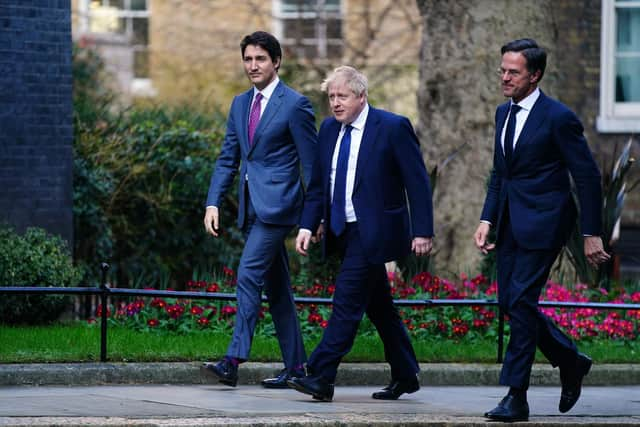Britain could start looking towards more home-grown energy, Boris Johnson suggests, amid Russia sanctions
The Prime Minister has promised a new “energy supply strategy” in the coming days but said there needs to be a “step by step” approach to reducing imports from Vladimir Putin.
Gas prices soared to a new all time high yesterday, while oil topped out at its highest cost for more than 14 years.
Advertisement
Hide AdAdvertisement
Hide AdUS Secretary of State Antony Blinken has previously said that officials in America are in “very active discussions” with Russian allies over oil sanctions, as countries across the West continue to impose measures to squeeze Putin’s regime.


The Prime Minister said it is “completely the right thing to do to move away from dependence on Russian hydrocarbons”.
But he told a press conference yesterday that the moves have to be taken “step by step”.
Speaking from Downing Street following meetings with the Canadian and Dutch Prime Ministers, Mr Johnson said: “We have got to make sure we have substitute supply.
Advertisement
Hide AdAdvertisement
Hide Ad“One of the things we are looking at is the possibility of using more of our own hydrocarbons.
“That doesn’t mean we are in any way abandoning our commitment to reducing CO2, but we have got to reflect the reality that there is a crunch on at the moment.
“We need to increase our self-reliance.”
Ministers are facing questions over whether they will put more support in place to soften the blow of any further increase in the cost of living caused by the sanctions on Russia.
Downing Street denied reports in yesterday’s Times newspaper that it might be flexible with its net zero targets, but acknowledged the public is concerned about the possibility of rising prices.
Advertisement
Hide AdAdvertisement
Hide Ad“We recognise people across the country will be thinking about the effect of sanctions which is why we are doing everything we possibly can to protect them from the repercussions in terms of cost of living,” a No 10 spokesman said yesterday.
Household bills could be set to rise even further, when gas prices shot up more than 70 per cent between Friday and yesterday.
A therm of gas cost 800p at one point yesterday morning, a record high, and up from 460p just before the weekend.
The cost fell back to around 590p by lunch time, but prices are now around 20 times higher than they were this time two years ago.
Advertisement
Hide AdAdvertisement
Hide AdThe increase in the cost of living is biting in all aspects of life across the UK, and an increase in the price of oil is also being felt at the petrol pump.
Over the weekend average petrol prices hit 155p a litre for the first time.
Figures from data firm Experian Catalist show the average cost of a litre of petrol at UK forecourts on Sunday was 155.62p.
The price of diesel is also at a record high of 161.28p
A year ago the price per litre of petrol and diesel was 124.32p and 127.25p respectively.
Advertisement
Hide AdAdvertisement
Hide AdThe cost of filling up a typical 55-litre family car with either fuel has become more than £17 more expensive over that period.
The RAC described the increases as “unprecedented” and called on the Treasury to cut taxes on the essential.
“These hikes are unprecedented and will sadly be hitting both homes and businesses hard,” spokesman Simon Williams said.
“It’s therefore vital the Chancellor acts quickly to limit the damage by cutting VAT to at least 15 per cent, which would save drivers 6.5p a litre and take the average price of unleaded back under £1.50.
Advertisement
Hide AdAdvertisement
Hide Ad“Importantly, this could also limit the impact of inevitable fuel price rises in the coming days and weeks.” Shadow Transport Secretary and Sheffield Heeley MP Louise Haigh similarly called it a “savage extra cost for millions of working people”.